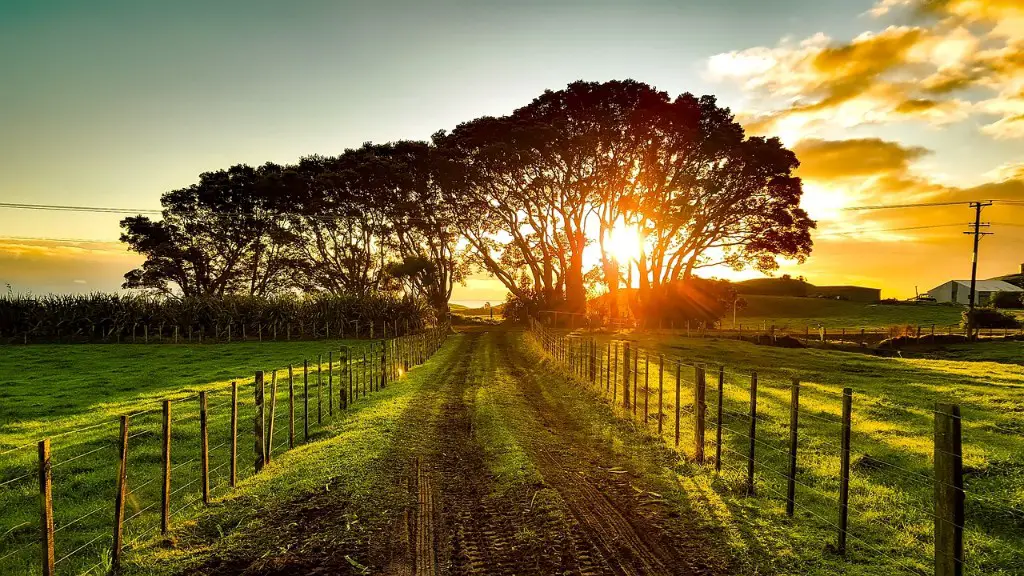In a world where the majority of people now live in cities and towns, it is easy to forget the importance of agriculture. Agriculture is not only the world’s oldest occupation, but it is also the foundation of civilization itself. Without agriculture, there would be no cities or civilizations. Ancient Egypt, for example, was one of the first civilizations to develop agriculture, and it was the fertile valleys created by the Nile River that allowed this to happen. Agriculture allowed the Egyptian people to settle in one place and build the pyramids, temples, and other great monuments that we still admire today.
So, why agriculture was not a mistake? Because without it, we would not be here.
Though some may view agriculture as a mistake, it was an important step in human development. Agriculture allowed for the domestication of plants and animals, which led to the development of civilizations. Agriculture allowed for the growth of cities and the rise of empires. It also allowed for the development of new technologies and the spread of knowledge. Agriculture was not a mistake, but an important step in human history.
Was agriculture the worst mistake or not?
There is no doubt that the rise of farming was a crucial turning point in human history. For the first time, we were able to produce enough food to support a large population. However, this came with a downside. As our population increased, we were forced to choose between limiting our population or trying to increase food production. We chose the latter and ended up with starvation, warfare, and tyranny. This was a mistake that we have paid for dearly ever since.
Agriculture is critical to society in many ways. It provides food and livelihoods for people around the world, supports economies through trade, and provides raw materials for products we rely on every day. Agriculture also plays a vital role in maintaining healthy ecosystems, providing habitat for wildlife and helping to regulate the global climate.
Was agriculture the biggest mistake in human history
Jared Diamond was right in saying that the invention of agriculture was the biggest blunder in human history. However, we are now stuck with it and need to make it work better than ever for the future of humankind and the planet. There are many mouths to feed today and we need to find ways to improve agriculture so that it can provide for everyone.
Farming allowed for the domestication of plants and animals, which led to the development of civilizations. This in turn led to the rise of social classes, with those who controlled the food supply having power over those who did not. This power dynamic has led to conflict and exploitation throughout history, and is still a major issue today.
Did agriculture make life better?
When early humans began farming, they were able to produce enough food that they no longer had to migrate to their food source. This meant they could build permanent structures, and develop villages, towns, and eventually even cities. Closely connected to the rise of settled societies was an increase in population.
The substantial increase in total agricultural production can be attributed to the advent of new technologies, innovations, and process improvements in the farm sector. Over the past few decades, there has been a significant increase in agricultural productivity due to the introduction of new technologies and processes. These new technologies and processes have allowed farmers to increase their production levels without compromising the quality of their products. Additionally, the use of new technologies has also helped to reduce the cost of production, making it more affordable for farmers to produce food for the masses.
What are 3 benefits of agriculture?
Agriculture is essential for human survival and development. It is the main source of food, fuel, and fiber for the world. Without agriculture, people would have to forage for food and would be unable to survive. Agriculture also providesRAW materials for many industries, including textile, paper, and construction. It is also a vital part of international trade, as many countries rely on imported agricultural products.
Aside from its economic importance, agriculture also plays a big role in a nation’s political and social development. In many countries, agriculture is a major source of revenue and employment. It is also crucial to a country’s food security and food sovereignty. Moreover, agriculture can help heal the environment by sequestering carbon, restoring ecosystems, and providing habitat for wildlife.
Given its importance, it is not surprising that agriculture has been a part of human civilization for thousands of years. It is an ancient industry that has always been at the forefront of human development. Today, agriculture is more important than ever before. As the world population continues to grow, the demand for food, fuel, and fiber will only increase. With proper management and investment, agriculture can continue to play a vital role in the development of the human race.
Farming can provide significant health benefits, both mental and physical. The work can be challenging and stimulating, providing a source of income in rural areas. Farm work can help develop younger generations, and farming can help the environment thrive.
Why is agriculture good for the Earth
It is important to preserve and restore critical habitats in order to maintain the health of our ecosystems. Agricultural operations are a major part of this and need to be sustainably managed in order to have the most positive impact. This includes using practices that help protect watersheds, improve soil health, and improve water quality.
Farming allowed humans to produce greater quantities of food than hunting and gathering, which led to larger populations. The ability to store surplus food meant that people didn’t have to farm for themselves and their families, which led to job specialization. Different people began to specialize in different tasks, which led to greater efficiency and productivity.
Did agriculture change society forever?
The Agricultural Revolution was a period of time when humanity began to transition from hunting and gathering to agriculture as their primary source of food. This change occurred slowly over the course of several thousand years and ultimately led to profound changes in human society and culture. The Agricultural Revolution allowed for the growth of civilizations and the rise of cities and empires. It also helped to create a more stable food supply, which allowed for population growth and the development of new technologies.
ove the past 10,000 years, as humans have transitioned from hunting and gathering to farming, they have lost an average of about 2.5 inches in height. This is likely due to malnutrition and other unhealthy lifestyle factors associated with early agrarian societies. In recent years, however, human height has been increasing as we have better access to nutritious food and improved medical care.
Why the agricultural revolution was good
The Agricultural Revolution was a period of unprecedented experimentation with new crops and new methods of crop rotation. These new farming techniques gave soil time to replenish nutrients, leading to stronger crops and better agricultural output. Advancements in irrigation and drainage further increased productivity.
The Neolithic Revolution was a time when people started to domesticate plants and animals, which allowed them to settle in one place permanently. This was a huge change from the way people had lived before, when they had to wander in search of food. The Neolithic Revolution was a time of great discovery, and it led to the formation of villages and the beginning of civilizations.
Was the agricultural revolution good?
The Agricultural Revolution was a huge change for humanity. It led to the development of agriculture, which allowed for improved living conditions and increased lifespan. Additionally, it allowed for the development of technology and all the perks of modern life.
Before farming, people lived by hunting wild animals and gathering wild plants. When supplies ran out, these hunter-gatherers moved on. Farming meant that people did not need to travel to find food. Instead, they began to live in settled communities, and grew crops or raised animals on nearby land.
Conclusion
Agriculture was not a mistake because it allowed humanity to domesticated plants and animals, which led to the development of civilizations. Agriculture allowed for the growth of cities and the rise of civilizations. It allowed for the growth of food surpluses, which allowed for the development of trade and commerce. Agriculture allowed for the growth of populations, and the rise of empires.
It is clear that agriculture was not a mistake, as it has allowed humanity to thrive and become the dominant species on Earth. Agriculture allowed for the development of civilizations and the growth of cities and towns. It has provided us with food security and allowed us to live longer, healthier lives. Agriculture has also been a key driver of technological innovation and has helped to shape the modern world.





